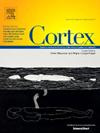Vocabulary learning and regularity extraction: Temporal dynamics of consolidation and associations with slow-wave sleep and sleep spindles
IF 3.3
2区 心理学
Q1 BEHAVIORAL SCIENCES
引用次数: 0
Abstract
Fast sleep spindles and slow-wave sleep (SWS) have been linked to memory consolidation, however, their associations with learning and longer term retention of different aspects of language remain unclear. We investigated the temporal dynamics of consolidation of vocabulary and grammar, and their links with these sleep metrics. Young adult participants were trained in the evening on an artificial language that used plural inflections with an underlying morpho-phonological regularity that was not taught explicitly. Some of the words were presented frequently and others infrequently. Polysomnographic measures were collected during the night following learning; participants were tested on the vocabulary, trained inflections, and generalisation to untrained words at four time points across nine days.
Accuracy on the vocabulary test improved across the first night following learning, and the change was positively associated with SWS duration. Memory for infrequent words declined towards Day 9, but greater spindle density during the first night was associated with a smaller decline. Although mean group accuracy on trained inflections did not significantly change overnight, individually, the change was negatively correlated with spindle density. Generalisation accuracy showed no change across time and no correlations with sleep characteristics. Overall, the results demonstrate that vocabulary and grammar learning have different temporal dynamics of consolidation and distinct patterns of association with sleep metrics. The findings suggest a protective role of spindles for long-term retention of memory, particularly of weakly encoded items, and emphasise the need to dissociate the benefits of SWS from those of spindles.
词汇学习和规则提取:巩固的时间动态与慢波睡眠和睡眠纺锤波的关联
快速睡眠纺锤波和慢波睡眠(SWS)与记忆巩固有关,然而,它们与语言不同方面的学习和长期保留之间的联系尚不清楚。我们研究了词汇和语法巩固的时间动态,以及它们与这些睡眠指标的联系。年轻的成年参与者在晚上接受了一种人工语言的训练,这种语言使用复数屈折变化,具有潜在的形态-语音规则,而这种规则并没有明确教授。有些词经常出现,有些则不经常出现。在学习后的夜间收集多导睡眠图测量;研究人员在9天内的四个时间点对参与者进行了词汇量、训练后的屈折变化和对未训练单词的概括测试。词汇测试的准确性在学习后的第一个晚上有所提高,并且这种变化与SWS持续时间呈正相关。对不常见单词的记忆在第9天下降,但第一天晚上纺锤体密度越大,下降幅度较小。虽然平均组精度训练变形没有显著改变一夜之间,单独,变化与纺锤体密度负相关。泛化准确率没有随时间变化,也与睡眠特征无关。总体而言,研究结果表明,词汇和语法学习具有不同的巩固时间动态,并且与睡眠指标有不同的关联模式。研究结果表明,纺锤体对长期记忆的保留具有保护作用,特别是对弱编码的项目,并强调需要将纺锤体的好处与SWS的好处分离开来。
本文章由计算机程序翻译,如有差异,请以英文原文为准。
求助全文
约1分钟内获得全文
求助全文
来源期刊

Cortex
医学-行为科学
CiteScore
7.00
自引率
5.60%
发文量
250
审稿时长
74 days
期刊介绍:
CORTEX is an international journal devoted to the study of cognition and of the relationship between the nervous system and mental processes, particularly as these are reflected in the behaviour of patients with acquired brain lesions, normal volunteers, children with typical and atypical development, and in the activation of brain regions and systems as recorded by functional neuroimaging techniques. It was founded in 1964 by Ennio De Renzi.
 求助内容:
求助内容: 应助结果提醒方式:
应助结果提醒方式:


